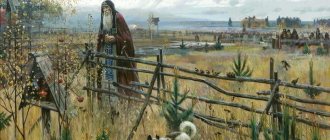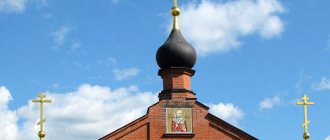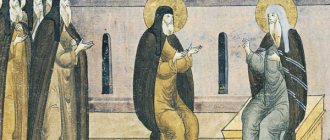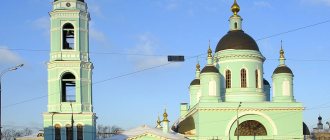The Life and Miracles of St. Sergius, Hegumen of Radonezh
It is good to keep the royal secret, and it is praiseworthy to proclaim the deeds of God, for failure to keep the royal secret is dangerous and tempting, while silence about the wonderful deeds of God harms the soul. Therefore, I am afraid to remain silent about the works of God, remembering the punishment that befell the lazy servant to whom the master gave a talent, but he buried it in the ground and did not receive a profit. None of the people, having the uncleaned thoughts of their inner man, are worthy of the work ahead, and I, overcome by passions, bound by the bonds of many sins, should not touch these wonderful events, but I should declare my iniquities and take care of sins, but desire attracts me, my unworthiness forbids me to remain silent, and my sins, like a heavy burden, weighed me down. What should I do? Dare I begin, damned one? Will I tell you or will I forbid myself? Will I pay for myself, who is worthy of regret, or will I listen to the good thoughts that come to my heart about the Reverend?
Father, help me so that my sinful mind does not become darkened, enlighten and instruct me when I write this Word; when I rest from my labors, raise my thoughts to praise you. I thought and cried a lot about my sins, afraid because of them I would not fulfill my desire - not to finish the writing I started, if you did not give me a helping hand. I am not able to give you the praise that is due to you, I can only tell you about a few of the many; and yet vouchsafe me to bring praise to you, who brings prayers to Christ God for my thinness. Even if all other people are worthy, then I am not worthy, drawn and wanting to get at least a grain from the meal of the elect, for many grains can satisfy the souls of the hungry, and it is the teachings and soul-helping words of the spirit-bearing fathers that strengthen not only the body, but the soul itself, encouraging it to spiritual achievements. A bright, sweet, enlightening memory of the all-honorable fathers, who were enlightened by Heavenly light and glory and who illuminated us, shone for us. The bright, enlightening and worthy of all kinds of honors from God, the memory of the fathers now calls, like a father to his beloved sons, your God-loving souls to a spiritual feast, meets, like a father, his dear child, lovingly fills souls with joy in this magnificent church and, before a carnal meal, offers a spiritual – angelic – food filled with the sweetness of Divine words, spiritual joy and fun. Scripture calls angelic food spiritual teachings, which the soul enjoys by listening to them with the mind, and is strengthened, just as the body is strengthened by earthly food. Having tasted the verbal sweetness and marveling at it, David says to God: “ How sweet are Your words to my throat, better than honey to my mouth!” I have been admonished by Your commandments, therefore I hate every way of lies.
[Ps. 118, 103–104]. Our ancient fathers, who became famous for fasting, said the same thing.
Following them and imitating their life, our venerable and blessed father Sergius, about whom we have already written a Word and to whom we now bring praise, hated all the ways of lawlessness and loved the truth. Truly this man is worthy of surprise and pleasure, because, being a man subject to the passions common to all people, he loved God more than all of us, despised all the temptations of the world and treated them as nothing and diligently followed Christ; and God loved the Rev. for his sincere desire to please Him, exalted and glorified him, for it is said: “ I will glorify those who glorify Me, and those who dishonor Me will be put to shame.”
[1 Sam. 2, 30]. How can the glory of one whom God has exalted be hidden? This means that we should also duly please and glorify Saint Sergius. The monk does not demand praise from us - it is needed for the salvation of our souls, therefore a good custom has been established: to teach future generations to describe the honors bestowed by God on His saints, so that the virtues of the saint do not sink into the abyss of oblivion, but a story about them, truthfully and intelligently written, would benefit the readers.
The story of virtue touches the hearts, like a sting, pricking the soul with the desire for a pure life in God. The Venerable Abbot, our father Saint Sergius, brought many souls to God with his pure and immaculate life; he was a wonderful old man, adorned with all the virtues - with a quiet and meek character, humble, well-behaved, friendly, good-natured, comforting, sweet-voiced, generous in alms, merciful, kind-hearted, humble-wise, chaste, reverent, poor-loving, hospitable, peace-loving, God-loving, father of fathers, teacher of teachers, admonisher of leaders, shepherd of shepherds, mentor of abbots, head of monks, builder of monasteries, praise of fasters, adornment of the silent ones, beauty of priests, splendor of priests, true teacher and true leader, good shepherd, righteous teacher, instructor in truth, prudent ruler, all-good leader, reliable helmsman, unpaid doctor, valiant intercessor, sacred servant of God, head of the community, giver of alms, hardworking ascetic, great man of prayer, guardian of purity, example of chastity, pillar of patience, who lived angelically on earth and shone in the Russian land as brightest star. His great virtue served to the benefit and salvation of many, helped many in their exploits, and was support and support for many. He was a teacher of Orthodoxy for the Christ-loving great Russian princes; a firm guardian of piety for nobles, thousands, other leaders, officials and the entire Christ-loving army; an intelligent and helpful interlocutor with archbishops, bishops and other saints and archimandrites; a refuge for honest abbots and presbyters; for monks - a ladder leading to heavenly heights; a merciful father for orphans, a cordial intercessor for widows; a consolation in sorrow, a source of joy for those who mourn and cry; a peacemaker for those who are warring and evil-minded, an endless treasure for the poor and weak, a great consolation for the poor who do not have food for the day, a healer of many ailments, a support for the weary, a support for the faint-hearted, an intercessor for the destitute, a helper for the offended, a firm denouncer of rapists and robbers, a deliverer from captivity, a liberator from slavery and imprisonment, a ransom for debtors, alms for all who ask, sobriety for drunkards, humility for the proud, a curb for robbers, a prohibitor for the covetous; for repentant sinners and for all who come to him with faith - a faithful representative before God.
The appearance and gait of St. Sergius were like those of an angel, his face was adorned with fasting and honest gray hair, shone with abstinence and blossomed with brotherly love; a meek gaze, a quiet gait, a tender face spoke of a humble heart, an exalted and virtuous life and the presence of God’s grace in it. Saint Sergius revered God, and God honored him with great gifts; Saint Sergius glorified God, and God glorified him on earth, according to the word of the Lord in the Holy Gospel: “... let your light shine before people, so that they may see your good deeds and glorify your Heavenly Father
"[Matt.
5:16] and again: “ And having lit a candle, they do not put it under a bushel, but on a candlestick.
A city standing on the top of a mountain cannot hide itself " [Matt. 5, 14–15] and so on.
God so exalted and glorified His saint - our Reverend Father, Blessed Sergius, that through his prayers people recovered from many illnesses and were healed of various ailments, many were delivered from demons and cleansed from temptations. The Lord so glorified His saint that they knew about him not only in the country where he lived, but also in distant cities and countries, among all the peoples inhabiting the lands between two oceans, not only in Constantinople, but also in Jerusalem. Not only the Orthodox were amazed at the virtuous life of the Saint, but also many of the infidels were amazed at his blessed life, for he loved God with all his heart and his neighbor as himself. Saint Sergius loved everyone equally and did good to everyone equally, receiving heartfelt gratitude for this; he had love for everyone, and everyone loved and sincerely revered him. Many came to the Reverend - not only from nearby places, but also from distant cities and countries, wanting to see and hear him, and received from his teachings and deeds great benefit for themselves and salvation of the soul, because he taught and did what he said it is said in the Acts of the Apostles: what Jesus did and taught from the beginning
[Acts eleven]. What St. Sergius taught in word, he himself did in deed.
Not only did the teachings of Saint Sergius instruct the people, many people benefited from just seeing the Saint. With his soul-helping instructions, he taught, converted through repentance to God and saved many Christians, some he clothed in a monastic and even an angelic image, and if one of the brethren died, the Reverend, having dressed the honest relics with his own hands, committed them to the earth. The saint brought many souls to God who were saved and are still being saved, remembering his soul-helping words and teachings - not only monks, but also laymen; the saint preserved the flock entrusted to him by God in piety and truth, being an example to his disciples in everything. He lived a pure, immaculate and godly life on earth; What he began in his youth, he carried out in his old age, without changing the monastic rules over the years of his life, without becoming lazy at all, without falling into despondency; It did not happen to him that he began his exploits in one way and finished differently - no, just as courageously and holyly he began, he completed just as firmly and wonderfully: he began with good intentions and finished, having acquired holiness, in the fear of God. The beginning of wisdom is the fear of the Lord
[Ps. 110, 10], and since the saint had faith, hope and love in abundance, he piously began his monastic life, lived it piously and completed it holy.
The Monk Sergius ended his life peacefully, retained his faith and received the crown of the righteous - a well-deserved reward for his labors and exploits performed on earth, for these labors were great and his exploits numerous: he steadfastly endured the burden of the daytime heat and the midday heat, suffering greatly in the winter cold, he bravely endured severe frosts - for all this he has now received the highest reward and great mercy.
Why do I speak at such length, without stopping, multiplying words, stringing them one on top of another, and dragging out my story, although I am not able to describe as befits the life of a good gentleman and holy elder, I cannot truthfully convey his character and adequately praise him? However, we will talk about many of his virtues in another place and express his praise if, through the prayers of the holy elder, God enlightens us and gives us strength; Now is not the time for this due to the impoverishment of reason and the pettiness of the mind.
I did not write in such detail for those who know for certain and in detail the pious life of the holy elder - they do not need my story. I have tried to collect and record information about his life for newborn babies and young adolescents - for those who have an immature mind, for when they grow up, mature, succeed in learning, reach the age of a perfect husband and maturity of mind, then, having heard from someone - or about St. Sergius, they will read my story, comprehend it and tell others, according to the word of Holy Scripture: “ Ask your father, and he will tell you, your elders, and they will tell you
"[Deut.
32, 7]. “ What we have seen, and heard, and known, and our fathers have told us, so that it will not be hidden from their children, who will tell it to their sons, so that the coming generation may know, the sons who will be born, and so that they may tell their children in due time, so that they do not forget the works of God
" [Ps. 77, 3, 6, 7]. Those who were that great holy elder’s servants and eyewitnesses of his exploits, disciples and closest associates, especially novices who saw him with their own eyes, heard him with their ears and touched him with their hands, ate and drank with the blessed one, were satiated with his teaching and enjoyed him virtues - all of them do not need our wretched story; they themselves can teach others, especially me, to reason, correct and guide me on the right path. For those who are just beginning to live, as I already wrote, who have not seen or known St. Sergius, and for everyone else, especially for new monks, this story is very useful and necessary so that the life of the saint is not forgotten - quiet, meek and kindly, so that his life would not be forgotten - pure, immaculate and untroubled; so that this life - wonderful, beautiful and virtuous - will not be forgotten; so that his many virtues and great deeds are not forgotten; so that his good customs and good example are not forgotten; so that his sweet words and dear teachings will not remain without memory; so that those wondrous mercies with which the Lord God enriched him would not remain without remembrance, and in our days he has been vouchsafed to see such a holy man and great elder.
Beloved! I wanted to remain silent about the numerous virtues of the blessed one, which I have already written about, but my inner desire forces me to speak, and my unworthiness does not allow me to remain silent. The thought that commands me to write dominates the rest, but the poverty of my mind blocks my lips, commanding me to remain silent. Both of these thoughts are fighting in me, and neither one wins, but I think it’s better for me to write in order to get at least a little relief and calm from the many thoughts that confuse me, so I decided to tell something about the life of the saint - a little out of many. Having collected the notes, I, with my wretched and sinful mind, composed a weak narrative in verse in honor and glory of the Holy Life-Giving Trinity and the Most Pure Mother of God and in praise of our Reverend Father Sergius. I dare to write, although I am in doubt, but I trust in the prayers of the blessed one, because his life was virtuous and perfect, and God glorified him. I, being weak, uneducated and insane, am afraid of the task before me, for even if I describe in detail the life of the saint, it is impossible to fully comprehend it, even if there was a person who could tell in detail about the Reverend Father, the great elder who lived in our days, times and years, in our country, among our people. Striving in virginity, purity and chastity, he lived an angelic life on earth, acquired meek patience and strict abstinence, achieved holiness and was honored with Divine grace; Even in his youth, he purified himself to become the temple of the Holy Spirit, and prepared himself, as a holy chosen vessel, so that God would dwell in him, according to the word of the Apostle: “... you are the temple of the living God, as God said: I will dwell in them
"[2 Cor. 6, 16].
Our venerable father Sergius from childhood, from a young age and from a young age, devoted himself to God and from the cradle was dedicated to the Lord, from infancy he was devoted to divine services; often going to church and studying there with sacred books, he studied the Divine Scriptures and, joyfully listening to them, absorbed holy words into his soul, as the prophet David said: “He will study day and night and will be like a tree planted by streams of water, bears its fruit in its season
"[Ps. 1, Z]. From his youth he fell in love with the monastic form and took monastic vows, from his youth he diligently practiced all the ascetic virtues and performed all the monastic feats, the light of Divine spiritual grace shone in his heart, enlightening his thoughts, and the grace of God assisted him throughout his entire virtuous life .
Saint Sergius acquired great abstinence, humility, chastity and unfeigned love for everyone. The fame of the saint spread everywhere, and people who heard about him came from afar to the monastery of the Holy Life-Giving Trinity and received great benefit, great benefit and salvation, for the Lord gave the Reverend the ability to understand all people and console the saddened. The monk carefully watched himself so that his mind did not cleave to any earthly objects or everyday concerns; therefore, he did not acquire any property for himself on earth - no perishable wealth, no gold, no silver, no treasures, no high and luxurious towers, no houses, no rich villages, no precious clothing. Instead of all this, he acquired true non-covetousness, poverty and real wealth - spiritual poverty, boundless humility and unfeigned love for all people. The saint equally loved and respected all people, regardless of their faces, without discerning, without judging, without exalting himself before anyone, without condemning, without slandering, without holding malice or anger against anyone, without having in himself rage, cruelty or ferocity; on the contrary, his words were always dissolved with the salt of grace and breathed pleasantness and love.
Who, hearing the kind and gentle answers of the blessed one, did not enjoy the pleasantness of his words? Who didn't rejoice looking at his face? Who did not repent after seeing his holy life? Who was not touched when he recognized his meekness and gentleness? What money lover, seeing the spiritual poverty of the saint, was not surprised? What covetous or proud person, seeing the height of his humility, was not amazed by it? What fornicator, seeing the purity of the Rev., did not leave fornication? Didn’t an angry and uncontrollable person become meek after a conversation with a saint? I have not met in our days and times a man like Saint Sergius, perfect in all good deeds and adorned with all kinds of virtues. Which of the other saints did God love as much as St. Sergius?
Sergius is both the first and the last for me at the present time. God gave it to us, the last generation, and glorified it in the last times, before the end of the world, at the end of the seventh thousand years151. Our venerable father Sergius shone in the Russian land, like a bright light in the midst of darkness and gloom, like a beautiful flower among thorns and thorns, like an unsetting star, like a ray sparkling with unearthly brilliance, like a lily in a worldly vale, like fragrant incense, like a fragrant apple, like fragrant rose hips, like gold in the mud, like silver, hardened, tested and purified seven times, like a precious stone, like expensive pearls, like a luxurious emerald or sapphire; he flourished like a date palm or a cypress by the water, like a cedar of Lebanon, like a fruitful olive tree, like fragrant aromas, like spilled Myrrh, like a blooming garden, like a fertile vineyard, like a heavy grape, like a closed vegetable garden, like a fenced garden, like a sweet hidden a source, as a chosen vessel, as alabaster152 of valuable peace, as an indestructible city, as an unshakable wall, as a reliable tower, as a strong and faithful son, as the foundation of the Church, as an unshakable pillar, as a luxurious crown, as a ship filled with spiritual wealth, as an earthly angel, like a heavenly man.
The elder reposed in the Lord in deep old age, having lived a virtuous life in reverence, truth, chastity, humility, purity and holiness; having completed his spiritual exploits, he departed from this life at the age of seventy-eight. Saint Sergius lived as a monk for fifty-five years, with zeal and abstinence, not overcome by laziness, but with cheerfulness and sobriety, and surpassed all modern monks with his labors and patience; He surpassed many of them in virtues and exploits. What is our life and our existence in comparison with the deeds and virtues of the saint? Compared to them, our monastic life is nothing and our prayers are like ghosts. As far as the east is from the west, we are so far from understanding the life of a blessed and righteous man. Here is his life, here are his works, deeds, exploits, hardships, numerous illnesses - this is the little that we were able to write about the saint, and even then not in order and not according to his dignity.
When the time came for the Saint’s death, he forbade his disciples to bury him in the church, but ordered them to bury themselves simply, outside the church, together with other brethren. Hearing this from the saint, the brethren were greatly upset and asked about the command of the Most Holy Archbishop. At that time, in the glorious and famous great city of Moscow, the throne of our Most Holy and Glorious Lady Theotokos153 was adorned by His Grace Metropolitan Cyprian154. Having thought and judged for himself where and how Blessed Sergius should be buried, the Metropolitan blessed the brethren and ordered them to lay the saint in the church on the right side, which was done. The body of the Reverend was buried in the church, which he himself founded, erected, arranged, finished, splendidly decorated and named in honor of the Holy Life-Giving Indivisible and Consubstantial Trinity; in his honest monastery - the famous monastery, the great monastery fence and the glorious monastery, which he himself erected, created and arranged; where he gathered the brethren - Christ's verbal flock of those being saved, which he shepherded in kindness of heart and taught with reason; where he himself took on a monastic image, and then an angelic one; where he put in so many works and accomplished countless feats; where he offered unceasing prayers; where he praised and sang praises to God daily and nightly with thanksgiving; where the many-year and long-suffering course of his life took place, uninterrupted by any absences, except for special needs.
The blessed one did not strive either to Constantinople, or to the Holy Mountain, or to Jerusalem, like me, accursed and insane. Alas, woe to me, crawling here and there, swimming here and there, moving from place to place! This is not how the Reverend lived - he did not wander from place to place, but, remaining in holy silence, listened to himself; he did not travel to many places and distant countries, but, living in one place, he praised God; he did not strive for vain and corrupt pursuits that were contrary to his soul, but above all he strove for the one True God, seeking the salvation of his soul, which the Lord gave him, for it is said: seek and you will find, knock and it will be opened to you
[OK.
11, 9]. Is there a person in our days who would love God as much and strive for him with all his heart, like the Reverend Father, about whom the prophet said: “ With all my heart I sought You
” [Ps.
118:2] and again: “I sought the Lord, and He heard me
” [Ps. 33, 5].
At the Dormition of Saint Sergius, many people from different cities and places gathered, and everyone wanted to get closer and touch his honest body or take something from his clothes for a blessing for themselves. Having been ill for some time, the elder reposed before the Lord, in the eternal abodes of bliss, having dried up his body with fasting and prayers, exhausting the flesh and mortifying carnal lusts, subduing bodily passions to the spirit, healing sinful spiritual wounds, rejecting worldly temptations, casting aside earthly worries, overcoming the fury of passions, despising the beauty of the world, gold and silver - all the tempting riches of the world he regarded as evil and despised. Having easily crossed the muddy sea of life, Saint Sergius brought his soulful ship, full of spiritual wealth, unharmed, to a quiet harbor, which he reached without hindrance; he ascended on spiritual wings to intellectual heights and was adorned with the crown of dispassion; he reposed in the Lord and passed from death to life, from work to peace, from sadness to joy, from exploits to consolation, from sorrow to joy, from vain life to Eternal life, from the temporary world to the infinite, from corruption to incorruptibility, from power to strength, from glory to glory. And everyone who came to the monastery and those who were there mourned the saint.
Princes, boyars and other nobles, honest abbots, priests, deacons, many monks and other people with candles and censers honored his holy and passion-bearing relics, sang the prescribed funeral prayers over them, in which they gave thanks to God, and after praying for a considerable time , they dressed the body of the deceased and decently lowered the coffin into the grave, as we have already written about. After the burial of the saint, the people who had gathered in the monastery mourned the Saint for a long time, and barely everyone went home in grief and sobs. Especially bitter tears were shed by his close disciples and beloved novices who made up his flock; they grieved beyond measure, lamenting, sighing, sobbing, quietly moaning with tears, walking around sad, sad, pitiful, drooping, inconsolable; When they met, the brothers said to each other with tears: “Forgive and bless, father and beloved brother in Christ. Our virtuous and blessed elder departed to the Lord, leaving us orphans. He went away for a great reward and reward for his deeds; he departed in peace to the Lord, whom he had loved since childhood; fell asleep in an eternal, well-deserved sleep and rested in the Lord in eternal peace, leaving us orphaned. We can only yearn and mourn our elder, for without him we became poor, orphaned, diminished, humbled, humiliated, fell into sorrow and misery, lost our minds, like a flock without a shepherd, like a ship without a helmsman, like a fruitful vineyard without a watchman and like a sick man without a doctor; We are all at a loss and feeling abandoned.” Such words or similar ones were spoken by the monks to each other in grief with tears.
Many had such strong faith in the saint that they not only visited him during his lifetime, but also after the death of the Reverend came to his tomb - they approached with fear, approached with faith, fell with love, embraced with tenderness, piously and reverently embracing with their arms, looking eyes, touching heads, kissing with love the shrine containing the relics of the blessed one; putting their clean lips to the coffin, they with warm faith, ardent desire and great love talked with him as if he were alive - truly he is alive after his dormition - and with tears they said: “O saint of God, saint of Savior! O Reverend Chosen One of Christ! O sacred head, blessed Abba the Great Sergius! Do not forget us, your poor, to the end, but remember us in your holy, pleasing prayers to the Lord. Remember your flock which you tended, and do not forget to visit your children. Having boldness towards the Heavenly King, pray for us, your spiritual children, O holy father; do not be silent, crying out to the Lord for us, do not despise us, who honor you with faith and love. Remember us, unworthy, at the throne of the Almighty and do not cease to pray to Christ God for us, for this grace has been given to you. We don't think you're dead; although you have departed from us in body, do not leave us in spirit, O our good shepherd. The coffin with your relics stands before us, and your holy soul, invisibly with the angelic armies, with disembodied faces, with the Heavenly Powers, gracefully and worthily rejoices at the throne of the Almighty. We know that you are alive even after death, because the prophet said: the souls of the righteous are in the hand of God, and torment will not touch them; their hope is full of immortality, because God tested them and found them worthy of Him; He tested them like gold and accepted them as an all-perfect sacrifice, for grace and mercy are with the saints and providence for His elect, and He visits His saints
[Prem.
3, 1–9]. The righteous live forever, their reward is in the Lord, and the care of the Most High is for them.
Therefore they will receive a kingdom of glory and a crown of beauty from the hand of the Lord [Wis.
5, 15–16]. The memory of the righteous is with praise, and the blessing of the Lord is on the head of the righteous
[Prov.
10, 6]. The righteous man, even if he dies, will be at peace, for honest old age is not measured in longevity and is not measured by the number of years: wisdom is gray hair for people, and the age of old age is blameless life.
As one who has pleased God, he is beloved and, as one who lived among sinners, he is set apart and caught up, so that malice does not change his mind or deceit deceives his soul [Wis.
4, 7–11]. Having achieved perfection in a short time, he fulfilled long years, for his soul was pleasing to the Lord
[Wis.
4, 13–14]. Therefore the Lord loves the righteous
[Ps.
146, 8], will preserve him and spare his life, blessed will he be on earth
[Ps.
40:3], and the righteous will never be in confusion, and God will not allow His venerable one to see corruption
[Ps.
15, 10]. The Lord is high: and he sees the humble
[Ps.
137:6], accepts the meek, and the Lord is close to all who call on Him in truth.
He fulfills the desires of those who fear Him; He hears their cry and saves them. The Lord protects all those who love Him [Ps.
144, 18–20]. The Lord loves the righteous in heart
[Ps.
145, 8], blessed are the blameless in their journey
[Ps.
118:1], the Lord preserves all their bones, and not one of them will be broken
[Ps.
33, 21]; when the righteous are glorified, people rejoice. Blessed is the man who fears the Lord [Ps.
111, 1], and he who lives under the roof of the Most High, under the shadow of the Almighty, rests [Ps.
90, 1]; planted in the house of the Lord, they bloom in the courts of our God, like the cedar in Lebanon
[Ps.
91, 13–14]. Such is the glory of the Church, glory to all the saints of God! Rejoice, ye righteous, in the Lord; praise is due to the righteous
[Ps.
32:1], the righteous will be remembered forever
[Ps.
111, 6], and the generation of the righteous will be blessed
[Ps.
111, 2]. How glorious are Your friends to me, O God.
how their dominion was established [Ps.
138, 17]. The Apostle Paul said: “ Rejoice in the Lord always;
and again I say: rejoice “[Phil.
4, 4]. Here are the words of the righteous man: “I humbled myself, and the Lord saved me, so return, my soul, to your rest, for the Lord has prospered you.
You have delivered my soul from death, my eyes from tears, and my feet from stumbling [Ps.
114, 7–8]; I have pleased the Lord in the land of the living.
This is my rest forever, here I will dwell [Ps.
131, 14]; I would rather be at the threshold of the house of God than to live in the tents of wickedness
[Ps.
83, 11]. When will I come and appear before the face of God with the voice of joy and praise of the celebrating crowd?
[Ps.
41, 5]. I will not die, but I will live and proclaim the works of the Lord.
The Lord punished me severely, but did not put me to death. Open the gates of truth to me; I will enter into them and glorify the Lord [Ps.
117, 17–19], saying: Lord, God of hosts!
[Ps.
83, 9]. How desirable are Your dwellings
[Ps.
83, 2]. My soul desires to die in Thy courts, for one day in Thy courts is better than a thousand
[Ps.
83, 11], for a thousand years are in Your sight as yesterday when it has passed away
[Ps.
89, 5]. As a deer longs for streams of water, so does my soul long for You, O God
[Ps.
41:1-2], for with You is the dwelling place of all who inherit joy, and with You is the source of life. Blessed are those who dwell in Your house: they will praise You without ceasing
[Ps.
83, 5]. Blessed are the meek, for they will inherit the earth
[Matt. 5, 5] and they will possess it.”
Truly, the righteous, meek and humble in heart will inherit a quiet and silent land, always cheering and delighting not only the body, but filling the soul itself with indescribable joy, and they will live on it forever. For the sake of this land, our Reverend Father Sergius despised all the delights of this world, he strove for it alone and diligently sought it - a meek and silent land, a quiet and serene land, a beautiful land, full of consolation, as the Truth itself said in the Holy Gospel: “ Seek , and you will find
pearls
, knock, and it will be opened to you
” [Lk. 11, 9; Mf. 13, 46]; or, in other words, the Venerable One received the Kingdom of Heaven from our Lord Jesus Christ. May we all be heirs of eternal bliss through the grace of our Lord Jesus Christ, to Whom befits all glory, honor and worship with His Beginning Father and with His Most Holy Good and Life-Giving Spirit, now and ever and unto ages of ages. Amen.
LitLife
Alexander Borisovich Tkachenko
Alexander Borisovich Tkachenko
The Life of St. Sergius of Radonezh retold for children
To the 700th anniversary of the birth of St. Sergius of Radonezh
Dear reader!
We express our deep gratitude to you for purchasing a legal copy of the e-book from Nikeya Publishing House. If for some reason you happen to have a pirated copy of the book, then we kindly ask you to purchase a legal one. Find out how to do this on our website www.nikeabooks.ru If you notice any inaccuracies, unreadable fonts or other serious errors in the e-book, please write to us at
Thank you!
Approved for distribution by the Publishing Council of the Russian Orthodox Church IS 14-401-0080
Illustrations by Elena Kabirova
People have different talents. Some people can draw beautifully, others can run fast and jump high, and others have a good ear for music. Some people find it easy to study at school, while others learn the art of dancing or singing. But what to do when the same study just doesn’t come to mind, even if you cry? Are only talented children able to study well? Of course not! The fact is that God gives all talents to people, to each in his own measure. And if you feel that you do not have enough strength and ability for something, then you can always ask God for help - ask him for talent for this difficult matter for you. It’s not for nothing that people say: God has a lot of everything. This means that God does not feel sorry for anything for a person. The main thing is that he uses this talent received from God for the benefit of himself and other people. Well, if you have doubts about this method, then here is the story of one of the most revered Russian saints, who also did not succeed in childhood... However, it is better to read the story from the very beginning and find out everything in order.
One day, Rostov boyar Kirill's foals got lost. They scattered from the meadow into the surrounding birch forests, look for them... Horses are generally smart animals, they stay together in the pasture, and do not go far from familiar places. And children, whether human or equine, are known to all strive to find adventures for themselves. The foals ran away from the meadow and did not return home with the rest of the herd. So what's now? The hour is uneven, the wolves will attack them, or the foals will get stuck in the swamp. But it must be said that boyar Kirill, although he was a noble man, had a simple disposition and did not protect his children from peasant labor. Another would have sent servants to look for the lost cattle, and that would be the end of the matter. Cyril sent his middle son Bartholomew to search for the foals. I knew that the boy loved horses. Let him gather up the skaters who have gone on a spree. Anything is more useful than sitting at home in vain. Moreover, things weren’t going well for him at all with his studies. Even if you cry, the boy is not given a diploma. Yes, Bartholomew cried more than once out of resentment: well, what kind of trouble is this - the brothers have been reading for a long time, and have learned to count, and are trying to write. Only for him, these squiggles in the Psalter just don’t want to form words. How hard he tried, how many sleepless nights he spent over the book, he followed all the teacher’s advice word for word. But the diploma just doesn’t go to my head. All that remains is to cry secretly behind the stove so that the father does not see. But the father is not blind either... He felt sorry for his son, he saw that Bartholomew was trying his best, but nothing came of him with a diploma. So after the next lesson I sent him to the meadow to get the foals. I suppose the sadness will dissipate faster in the open air. Bartholomew wandered for a long time through the surrounding hollows and copses.
He called his horses and looked for their tracks on the wet ground near the stream. Finally, in the grove at the edge of the field, I heard a familiar neigh. Here they are, their father's foals, all four of them. They raised their muzzles and feasted on young birch shoots. “Nothing,” thought Bartholomew, “I have a tastier delicacy for you.” He took out a crust of rye bread from his knapsack and gave each one a piece. That's it. Now they will run after him as if tied all the way to the house, waiting for more treats. And Bartholomew went home with his skates.
Suddenly, on a hillock, under an oak tree, he looks at an old man in monastic robes. He stands alone and prays to God. “No other way, this is a holy man, a saint of God,” thought Bartholomew. “I’ll ask him to pray for me too, so that I will finally be given a book diploma.” He stood at a distance and began to wait. The elder finished his prayer, saw the boy, called him to him and asked what he needed. Then Bartholomew suddenly began to cry and began to talk about all his sorrows. The monk listened to him, smiled and said briefly: “Let’s pray together so that the Lord will give you book understanding.” And when they prayed, he took out a box from his bosom, and from it he took out a piece of prosphora - church bread - and gave it to the boy: “Eat this, as a sign of God’s mercy to you.”
Bartholomew obediently ate the prosphora. The monk said goodbye and wanted to go on his way, but Bartholomew begged him so much to come visit that he agreed. We came home. Bartholomew's parents were delighted when they saw the holy wanderer on their doorstep. They immediately took his blessing and ordered the servants to set the table. But the guest was in no hurry to dine.
“First, let’s taste spiritual food,” he said to Bartholomew and went with him to the prayer room. In those days, such rooms were in the house of every boyar and prince. There the elder gave the boy a book and ordered him to read prayers.
“But I don’t know how,” Bartholomew objected. “Don’t chat in vain,” the elder smiled, “read.”
And he blessed him with the sign of the cross. Bartholomew obediently opened the book, and... the words of prayer poured out from him without the slightest hesitation. The letters on the paper finally began to form into words, and the words into sentences. The boy read smoothly and clearly, no worse than a village deacon. The parents, standing in the doorway, could not believe their eyes - was this really their Bartholomew?
So, with God's help, the future abbot of the Russian land learned to read. From that day on, Bartholomew discovered amazing learning abilities. The diploma, which had never been given to him, was finally mastered. After such a miracle, the boy had a desire to serve God. He wanted to retire, following the example of the ancient ascetics, and become a monk. But his love for his father and mother kept him in his family.
Bartholomew was a modest, quiet and silent boy, meek with everyone and obedient to his parents in everything. They also loved Bartholomew, and he, having received their permission, from the age of twelve began to accustom himself to the life of an ascetic - he fasted so strictly that on Wednesdays and Fridays he did not take food at all (as especially pious adults did then), and on other days he ate bread and water. This worried my mother at first, but then she saw that Bartholomew was growing strong and healthy even with such meager nutrition. He often visited the temple, and at home he spent whole nights in prayer and diligently read the books of the holy fathers.
The meaning of Sergius of Radonezh for the Orthodox
Sergius of Radonezh came to Russian soil when the Tatar tribe had filled almost the entire territory of the fatherland, and the princes were engaged in fierce civil strife.
These enormous problems promised complete destruction for Rus', so the Lord called upon St. Sergius to free the people from cruel misfortune. To strengthen and raise moral forces that had been weakened for a long time, the saint set a vivid example of a pious life: honest and disciplined performance of work, restrictions of the flesh and tongue.
Holy Venerable Sergius of Radonezh
The Monk Sergius of Radonezh demonstrated unprecedented philanthropy, patience and knowledge of psychological aspects. He knew how to devote all his time to the common cause, well-behavedly preaching true religiosity.
The saint did not hesitate to try on the responsibilities of any profession: he was engaged in cooking, baking, carpentry, chopping wood, grinding flour. He was a true servant of the brethren, not sparing himself and never falling into despondency.
Read about Sergius of Radonezh:
- The relics of the monk
- Church of St. Sergius in Moscow on Ryazanka
- Icon of Saint St. Sergius











